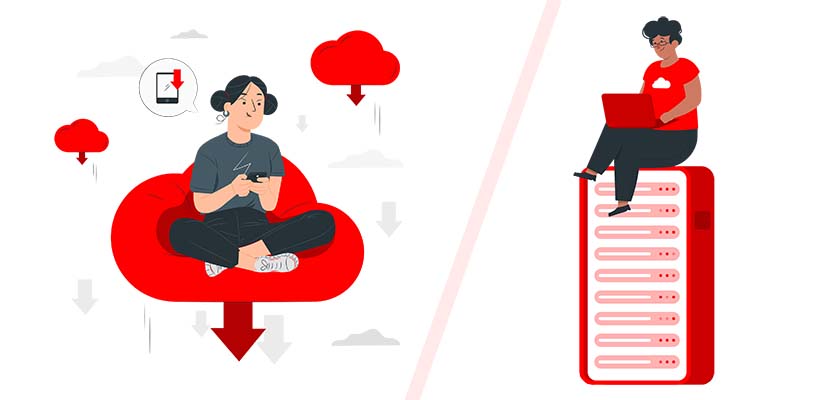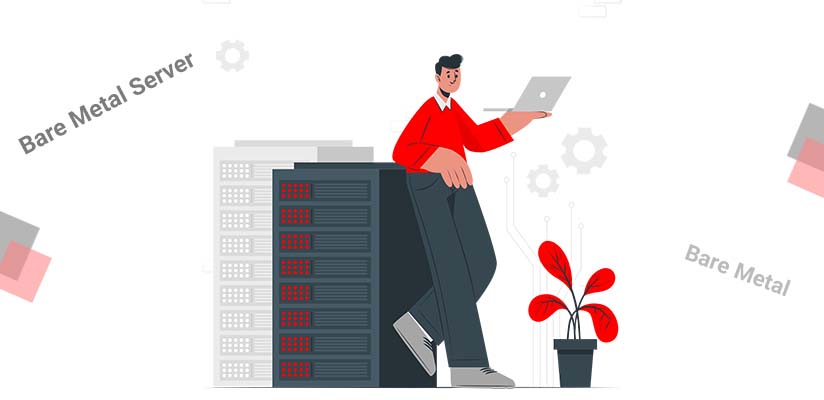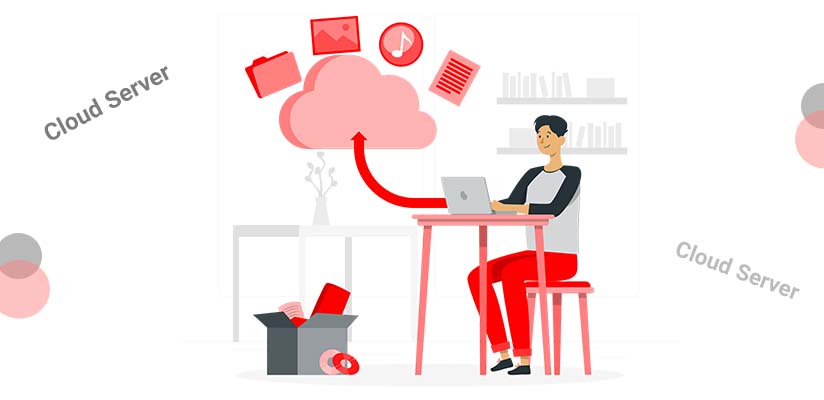
Bare-metal servers are like dedicated servers in that they’re each a single-tenant machine. This kind of machine gives users complete access to hardware. There is a possibility to gain such access because single-tenant machines don’t use the hypervisor layers, which are the ones that create the virtual machine (VM) and put it onto the server. In order to eliminate the need for layers, the operating system is directly loaded on the server. This direct loading leads to some of the fastest servers available.
In bare-metal servers, it is possible to set up the processor as well as memory (unshared) as well as storage. Virtual machines don’t have this capability since the provider controls the hardware.
Both bare metal server vs cloud server servers offer users reliable performance due to the fact that the hardware powers their web hosting and applications exclusively. The main distinction between bare metal vs cloud server boils down to the degree of flexibility in the contract in addition to the high quality of the hardware.
High-end processors RAM, NVMe solid-state drives, as well as other hardware devices that are the bare metal servers. Servers that are dedicated do not come with these features.
For contracts, cloud servers provide the option of billing more flexibly. The only cost you pay is the amount you utilize them, and they also have a pay-by-hour option. So, what is the main difference between bare metal and cloud server?
What is Bare Metal Server Hosting?
What is a bare metal server? And should you buy bare metal server? A bare-metal server is a physical server that is dedicated to one tenant. The tenant of the server can customize the server in accordance with the requirements of its performance security, reliability, and security. An alternative to a traditional steel server can be described as a virtual server where many users share a server’s computer, storage, and other resources.
Bare metal servers are called single-tenant physical servers or dedicated servers that are managed. In a bare-metal server, its operating systems directly plugged on the server, removing layers and providing higher performance.
A business may run dedicated servers at their own data center, or colocation centers or lease them on an hourly or monthly basis from a managed service provider.
What is Cloud Server Hosting?
What is a cloud server? Is it worth it to buy a cloud server? Cloud server is a pooled central server resource that is hosted and distributed over an Internet network, typically via the Internet. It can be accessed at any time by many users. Cloud servers are able to perform the same functions as physical servers providing computing power, storage capacity and applications.
Cloud servers can be found anyplace in the world, and provide services remotely via cloud computing environments. Contrary to conventional dedicated server equipment is generally placed in a physical location for use only by a particular company.
Differences Between Bare Metal Server vs Cloud
The main difference between bare metal servers as well as cloud servers is the latter is a virtual machine and the one is a physical machine. A bare metal server is a physical object and is easily identified inside a data center. Although it may sound evident, in the age of virtualization this distinction is vital. The bare metal server sometimes referred to as a physical server or dedicated server, is in a secure and controlled secured data center.
If you buy cloud servers it is a virtual machine (VM). The VM is characterized by abstract disks memory, CPU, and memory The virtualized server is simple. In this multi-tenant system, it is possible to have several virtual instances, which means that the host computer is sharing its resources. Each user is entitled to a certain amount of RAM, CPU, storage, and also the most popular cloud configurations. Each user gets just a small portion of larger shared storage.
Pros and Cons of Bare Metal Server

Pros of Bare Metal Server
Are you focusing on performance as your primary goal? If so it’s impossible to go wrong with the bare-metal option. They are more efficient for high-demand applications and can handle the load of heavy work. Processing of large data volumes, applications that are affected by performance, almost any process that needs greater resources will benefit by running on a bare metal server.
They also provide the benefit that they dedicate all the hardware resources to one tenant. Because it is only a single user, performance degrading and variations are less likely. Servers with only one tenant offer the advantage of superior security. An organization that is sensitive to security may be hesitant to select multi-tenant environments since the possibility of violating the law is higher than in a single-tenant environment.
This setup is performance-oriented, and if that is what your business is looking for, this might be the right solution for you. One of the major benefits of using bare-metal servers includes increased processing power, greater output, and input operations per second, and more consistent network I/O as well as disk performance. In addition, you get an improved service quality because it can eliminate noise neighbor issues that you might encounter in a multi-tenant setting.
Cons of Bare Metal Server
If you work in a setting that has fluid workloads and performance isn’t important and you need to be able to perform your work efficiently, bare-metal is the ideal option. This is also true for applications that move fast and often or when you have tasks that need to run for a limited amount of time before switching off. In this kind of situation, the bare metal option isn’t the most ideal solution and you may want to consider switching to the cloud server instead.
If you aren’t concerned about the performance of your hardware it is possible to be paying more for a single-tenant environment, which isn’t the most cost-effective way to set up an option. If you are looking for a flexible environment, then bare metal may not be the right option. In order to improve your systems, you’ll need to purchase new equipment, set it up and update it. This requires time. You also need to shut off the device to make the adjustments, which causes delays.
Pros and Cons of Cloud Server

Pros of Cloud Server
If you want to complete a variety of tasks, Cloud servers are the best way to take. The addition of new resources to each virtual machine and then creating a new server is done in just a few minutes. Cloud servers are renowned for their capacity and flexibility. In environments with different workloads, cloud servers can rapidly scale their performance. This can also be a cost-effective solution.
The cost is for the required performance per minute and the cost remains at a minimum if you are dealing with tasks that aren’t demanding. Virtual machines are great for those who require a fast and efficient server environment in which you can connect to applications and data, utilize the machines, and then switch off the machines according to the workflow you are using. Additionally, it is a highly flexible environment that is built upon an infrastructure that is high-availability to provide a secure system.
Equipment and security aren’t as relevant to the virtual machine run by the host machine. In the virtualization world improving performance is resolved in just a few seconds, and doesn’t need to be permanent.
Cons of Cloud Server
The incredible power provided by bare metal cannot be equaled by virtual machines. However, there is the benefit that you can dynamically scale performance but resources are shared within an environment with multiple tenants. If one of your neighbors is processing data at a high speed and there’s less capacity available to you. If you have processes or applications that demand massive loads the cloud server may fail to cope with the demands of performance because of its limitations. This can cause poor performance and higher costs over the time that you utilize more resources than you normally would.
The performance of the physical hardware isn’t known, accessing it may be difficult in a variety of situations. It isn’t clear what the host’s condition is if it has inadequate equipment, making you unaware of the actual load. Security-wise, even if your VM runs OS, which will be considered to be an additional layer of security it is vulnerable to hacking from outside. In the event of a security breach, there is no direct access to the operating system, which means you’ll have to freeze your data on the spot.
Conclusion

Many businesses gain an advantage in competition with cloud and servers made of bare metal. They are able to manage large applications, workloads, and even process data. Both solutions share a lot in common however, when you look at the distinctions between Cloud and bare metal server it is easy to see that each comes with its own advantages as well as disadvantages. When it comes to which one is right for your business, it all depends on the nature of your business and the kind of work you have to handle.
If you require sheer horsepower to run performance-sensitive applications and heavy workloads, then bare metal servers might be right for you! However, if you’re seeking a flexible environment that is low-cost and runs on a high-availability network it’s best to buy a cloud server.
Check Bare Metal Server price vs Cloud Server Price.
Leave a Reply